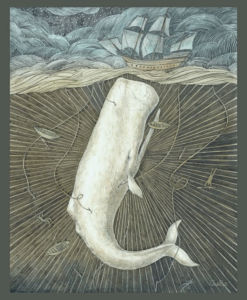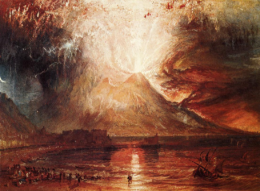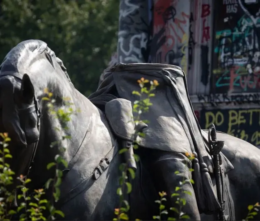Author: Kathryn S.
-
4,140 words
Part 2 of 2 (Part 1 here)
Battle of the Sexes: Femmes Fatales Walking the Streets and Roaming the Moors
Relationships can bring men and women lots of joy. They can also cause a lot of pain and suffering, and sometimes simultaneously. This section is dedicated to those who have discovered that their worthy opponent was the man/woman they loved. And hated. (more…)
-
Part 1 of 2 (Part 2 here)
There is a wonderful Ridley Scott film from 1977 called The Duellists, based on a Joseph Conrad short story, “The Duel.” It follows the exploits of two hussars in Napoleon’s Grande Armée as they traveled from 1800 Strasbourg, to 1812 Russia, and back again to France after Napoleon’s final defeat at Waterloo. Were their enemies the Prussians, or the Russians, or the British? No, their true enemies were one another — (more…)
-
6,722 words
It was the summer of 79 AD. The celebrated naturalist and Roman navy admiral Pliny the Elder sat on an outcrop and looked toward the western sea, lit with the fires of a setting Sun as if he was taking stock of a life well-lived, and the once-and-future prospects of his beloved country. To the east, also set briefly ablaze like a torch in the purpling sky, he could see Vesuvius: reliable, peaceful Vesuvius. (more…)
-
About a week ago a young black employee brought back news from the ghetto (colored folks are now the only reliable and honest sources left when it comes to these sorts of adventures). Earlier that afternoon, “authorities” had placed her high school on lock-down. A student had marched through the front doors with a gun and then began shooting up the place. Only notoriously bad black marksmanship prevented the school from becoming an abattoir. He then turned and fled, hiding somewhere inside the building (supposedly). (more…)
-

Illustration from J. N. Dolfen’s Darkness Over Cannæ (2020).

Illustration from J. N. Dolfen’s Darkness Over Cannæ (2020).
7,819 words
And I have in mine owne bowels made my grave, That of all nations now I am forlorn, “I was that citie that the garland wore . . . delivered unto me By Romane victors, which it wonne of yore; Though not at all but ruines now I bee, And lie in mine owne ashes, as ye see.”[1]
Scipio’s Tears, Scipio’s Oath
There was that memorable scene, played again and again in every age. That vision of ruin at the moment of triumph. So did Napoleon later look out on the vale leading down to the Olomouc Road and see that the hunt after honor had reared a trophy for “devouring death.” (more…)
-
When I first began frequenting Counter-Currents, I was working at a university as a “writing consultant,” which — stripping away the fancy-sounding title — meant that I was a tutor, or “paper doctor,” as I called it. And as a “paper doctor,” my professional diagnosis was usually that the assignments themselves were lousy — dead on arrival. (more…)
-
The year was 939 AD, the setting near the city of Simancas. Count Fernán Gonzalez, a commander of free Spain, rode at the head of an army whose mission was to strike a blow against the Saracen invaders of Al-Andalus. Still, they were outnumbered and desperate. Fortune, it seemed, would favor the Moors on this day. But as the Count’s troops prepared to clash with their foe, a miracle occurred. (more…)
-
It was a sweltering July afternoon at the Malvern Hill battle site — more than 150 years gone since it had been the scene of General Robert E. Lee’s debut in the 1862 Seven Days campaign. It was the conclusion of his defense of Richmond from the numerically-superior Army of the Potomac, led by George McClellan. (more…)
-

Richard II, the English monarch whose missteps inaugurated the decline of respect for royal authority in Britain.
2,247 words
Part 3 of 3 (Part 1 here, Part 2 here)
A “Cony Struggling in the Net”:[1] The Plantagenets vs. the Plantagenets
Legendary for its blizzards and blood, the fifteenth-century English conflict known as the Wars of the Roses (1455-1487) was poetic in name and savage in fighting. Medieval warfare was the most physically brutal form of battle Westerners in their long history have ever fought: huge, murderous fistfights of chaos and close combat in which few were afforded a “clean” death. (more…)
-
Part 1 of 3 (Part 2 here)
Dual Charismatic Cycles of the West
“Heed my words all classes of men, you greater and lesser children of Heimdall”: When all “the gods went to their thrones, those holy, holy gods,” they came to a decision. They would make leaders from “Ymir’s blood and his rotting limbs.” (more…)
-
6,404 words
“The consternation is universal throughout this district,” began a frenzied letter dashed off from the French town of Marvejols. Sometime “in the night we had a great storm here attended with lightning and thunder such as we have scarcely known in the greatest heats of summer.” The “wild Beast which hath long” haunted the forests “of St. Come, four leagues from hence,” has carried off “a shepherdess 18 years of age, who was celebrated for her beauty.”[1] Non, my friends, ce n’était pas un film de Disney. C’était vrai! Dated November 23, 1764, this note spread word of a true horror that had for months stalked the southern gorges of France. (more…)









